Eszter's Weekly Elephant: Issue #1
Uncover the unvarnished truth and discover yourself!
Welcome to the readers of Eszter’s Weekly Elephant! My husband and I hope you will find the content here intriguing, useful, and entertaining!
Why Weekly Elephant?
Why do we call this publication Eszter’s Weekly Elephant? Here, we will discuss matters that many are aware of but few dare to speak of, and even fewer dare to deeply inspect and understand. In my experience, the only viable path to happiness and peace is to uncover the unvarnished truth for ourselves. This involves questioning what we hide deep in our hearts, how we feel about various situations, people, and ourselves, what truly motivates us, and confronting even those ugly aspects within us that we find unforgivable.
So, when my husband asked what I wanted to write about here, without hesitation, I answered: the truth. The elephant in the middle of the living room is well-known to many, yet they have become so accustomed to its presence that they automatically sidestep it. Meanwhile, others deny its existence, while some are so blind to it that they constantly trip over it. I want to show how to safely and amicably guide the elephant out of our subconscious living room without it breaking our precious porcelain. Believe me, it’s not as complicated as it seems! Just a few good questions, a few well-understood connections, and some self-reflection are needed. It’s worth a try!
How did I get involved in this?
I find the human psyche incredibly exciting. As a teenager, I became interested in this topic, read a lot about it, and constantly experimented on myself to find those methods and paths that allowed me to navigate life's challenges more easily, happily, and authentically. With the help of my husband, I want to share these decades of experience, as well as the insights gained as a family constellation therapist with clients and my own family. We hope to shed light on many connections within ourselves, our relationships, and our parent-child dynamics.
I strongly believe that understanding and processing these aspects can help everyone live more harmoniously. I must thank my husband for his support and courage, often willing to play the role of guinea pig, and for the many insights he has provided thanks to his sharp logic and continuously increasing sensitivity.
To the obvious question that follows, my answer is no. I am not a psychologist or psychiatrist. The insights and experiences shared here were gathered and honed by myself and my husband, often at the risk of our own "emotional skin", just like a mad scientist self-administering an experimental drug.
As a family constellation therapist, I have helped more than a thousand people solve all sorts of conflicts or problems, ranging from relationship and financial issues to infertility, conflicts with parents, and even their child's stuttering or chronic ear infections. My experience is that every problem starts in our soul, and if we want lasting results, that's where we need to search for solutions.
Logically following from the above, the writings here do not constitute professional psychological or psychiatric advice, even more so because I have often encountered that traditional psychological or psychiatric approaches did not yield results, but the approaches described here did. Therefore, everyone should read and apply the content at their own risk.
My husband and I feel that these methods are very effective, and this way of thinking about the human psyche is a great help in improving human relationships. This is based on what we have experienced and achieved in our own lives. During our seventeen years of marriage, we have changed a lot, fought battles with each other and ourselves. We learned to communicate lovingly and effectively and to quiet our egos when tensions flared. From a relationship filled with arguments, between two people from completely different cultures and both wounded in many ways, we evolved into a strong, peaceful partnership based on understanding and love. Our relationship changed because we transformed ourselves. My husband, who used to be often angry due to his childhood experiences and easily thrown off balance, became a peaceful, empathetic, and flexible person. I, on the other hand, transformed from a seemingly extroverted, but actually extremely introverted, infinitely reserved person who hardly ever revealed herself to anyone, into a writer who dares to share her innermost thoughts with the world and open her heart.I remember that at my first family constellation, my writer self literally peeked from behind the couch, feeling like she would die if she had to come out into the open. Now, with eight written and three published books, numerous articles and short stories behind me, I certainly do not peek from behind the couch anymore.
We also achieved financial freedom, which enables us not to be tied to a nine-to-five office job. This is a true blessing for two creative individuals who are not well-suited to monotony. When we worked in an office, I remember that one of my biggest wishes was to be able to walk around the city or in nature during the day and soak up the sun. I feel truly blessed that today I have the freedom to do just that.
These improvements would not have been possible without the courage and persistence we had in getting to know and heal ourselves. Healing is the only way to create a better, happier life.
How is Weekly Elephant structured?
In Weekly Elephant, articles will appear weekly, some of which will be accessible to everyone, while others will be available only to paid subscribers. Every Friday, we will send a summary of the topics published that week, where we share additional experiences and expand on what was written in the articles. In the weekly digest, besides the aforementioned, there will also be thoughts on the psyche worth pondering over, techniques for a few minutes of self-reflection to discover exciting truths about ourselves or our lives, or even to find the strength and motivation needed for change or to make changes.
From my experience, stories and tales are very effective in helping overcome a stalemate, often symbolically pointing to a solution for a situation, so from time to time, Weekly Elephant will feature short stories as well. The rest will be a surprise!
So, let's dive in!
On Eszter’s Weekly Elephant, you can already find many articles covering various topics.
I believe articles like “Cactus Children” or “Fairy Tale Game” can provide very useful advice, since everything is based on the premise that we should quickly and fully understand our feelings when we find ourselves in a situation.
Cactus Children — The Results Of “Water-Deprived Child-Rearing”
Increasingly, we are using the vivid expression "prickly" less and less to describe surly, tough people. Yet, this descriptor very aptly suggests what to expect if we dare to get too close to them. Most people won’t take that risk. They prefer to avoid those sharp, unfriendly thorns. Similarly, many dislike cacti even though a majority of them occasionally reward caregivers with dazzling, albeit short-lived, flowers.
Fairy Tale Game — How Do We Teach Our Child to Feel and Communicate Their Real Emotions?
While working with clients, I frequently encounter individuals who are disconnected from their own feelings, meaning they have no idea what they are genuinely feeling in a given situation. If you find yourself fuming over a situation three days after it occurred, or realizing a week later that someone offended you, chances are you have difficulty connecting with your emotions.
As a therapist, my experience is that most people react to situations without truly understanding what is happening inside them, and without feeling the emotions the situation evokes in them and why. Often, they only realize later how angry, hurt, or sad they became over something, but by then, the time to respond sensibly has already passed. This is like a boxer who, despite receiving punches from the opponent's right hand, continuously defends on the left side, or in a more severe case, doesn't even realize they're being hit until later, when their nose and mouth are bleeding and they're nearly knocked out. By then, their chances of winning the match are significantly lower.
Adults whose boundaries were constantly stepped over in childhood, whose feelings were ignored by their parents and caregivers, or who were victims of abuse, often suffer more from the "emotional blindness" or delayed emotional awareness mentioned earlier. Simply because they were punished even for mentioning how they felt in a situation. They were never really allowed to delve into themselves and examine their feelings. Even if they did, it didn't matter because the adults treated this information as irrelevant.
Therefore, many of us have to learn boundary defense in adulthood. However, to do this effectively, we often need to process serious traumas. The “Boundary Defense” article and others about assertiveness help us understand why we struggle to protect ourselves and why we can't say no, even after extensive training. Through my own example, they provide a compass to help us find answers to when and why we stopped defending our boundaries.
Border Defense — Do Our Psychic Bastions Even Exist?
Many times, I’ve been in situations where someone overstepped my boundaries. Yet, I didn’t activate my defenses. Usually, I would just endure the situation, trying to put on a brave face, hoping to avoid conflict. The conflict which wasn’t my doing but caused by the other person’s insensitivity or malice. For a long time, I felt there was nothing wrong …
Can Assertiveness be Learned? Or Not?
Assertiveness is a behavior that allows a person to confidently assert their own interests while also taking into account the interests of others. This is done without resorting to aggression or passivity and without unconditional submission to the interests of another. In order to behave assertively, it’s crucial to clearly express our desires without getting sidetracked by emotions or beating around the bush. It also helps if we come across as confident and calm, both in our posture and in our voice. Most sources claim that assertiveness is a skill that can be learned. This is true, but only under certain conditions.
If we are consistently unable to protect our boundaries, we will eventually become very angry. Two articles talk about the origins of this anger, the usefulness of anger as an emotion, and how to calm our fits of rage, which are worth reading for those who occasionally erupt like the Iron-Nosed Witch.
Emotions, the Language of Our Soul — Anger
What does our soul truly want to convey when we get angry? We all tend to nurture the idea that we become angry only very rarely and only under very justified circumstances. Because being angry is not okay. Because only those who mishandle their lives and the situations around them get angry.
Anger Management — How To Tame The Raging Bull
Heated bouts of anger can be dangerous, not only for ourselves but also for those around us. What can we do to make them stop? Are we really angry at the person we think we are? Many clients came to me with a problem: they struggle with severe anger attacks. This can frighten their families, cause issues at work, and sometimes even lead to physical altercations in bars. Not to mention that in such a state, we might endanger children or pets.
On the site, you can find several articles that shed light on the real causes of common relationship problems. These articles cover a range of topics, from our ability to form genuine relationships without hiding aspects of our personality, to choosing sides in conflicts between parents and partners. They also explore why our partners can hurt us deeply and why understanding this can be beneficial. A romantic relationship is one of the most beautiful, yet most challenging human connections. This is evidenced by how many people long for a happy marriage/relationship and how many end up divorcing... From my experience, relationship conflicts often hide invaluable treasures, though unearthing these treasures can be a challenging task. The relationship articles already on the site and those to come will help in this treasure hunting.
Relationships — A Personalized Training Program
It’s particularly true in relationships that they tend to push the very buttons that cause the most pain. As challenging as it may be, this is useful because it gives us a chance to heal those wounds. The cornerstone of human society is the family, typically commencing with a romantic relationship that may culminate in marriage. Subsequently, if all unfo…
Sending Only Our Emotional Surrogates to Our Relationships?
In the movie “Surrogates,” people sent robots into the world instead of themselves, which they controlled remotely. This way, they shielded themselves from harm. Do we also send only our emotional stand-ins into our relationships? The film “Surrogates,” starring Bruce Willis, was released in 2009. In this movie, everyday life was conducted by robots on behalf of humans, allowing individuals to control these robots from the safety of their homes. The robots were all attractive and youthful, and they could be operated by people of any age or appearance.
Whom Should I Be Loyal To? — Choosing Between Our Parents and Our Partner
Many couples grapple with the challenge of one partner’s parents exerting a significant influence in their lives, often resulting in compromises being imposed on the other. Whether it’s decisions related to leisure time, parenting choices, or even seemingly trivial matters like how to serve holiday soup, it’s often the mother-in-law or father-in-law who…
Articles like “Biophilia,” “Walk Through the Difficulties,” or “How to Start Healing from Sexual Abuse” provide practical advice, while writings about friendship, assistance, or the possible withdrawal during transformation offer exciting new perspectives for those who are open to them.
Biophilia vs. “Human Zoos”
Do we harness the ancient healing power that nature bestows upon us, or do we confine our lives exclusively to the triangle of work, commuting, and home, much like captive zoo animals? How great is our need for nature, and what are the consequences of its absence?
Walk Through the Difficulties!
“The longer I run, the smaller my problems become.” If I recall correctly, this was a line from an Adidas advertisement in the early 2000s. I couldn’t agree more. Running and walking with my two dogs back then was a lifesaver. On Saturday mornings at seven, we were already up on Triborder Mountain and returned home by eleven. The open space, the burgeoning green, or the squeaky cold of winter restored my zest for life and likely prevented me from becoming depressed or contracting some severe illness after a
How to Begin Healing from Childhood Sexual Abuse?
Many have approached me regarding the aftermath of childhood sexual abuse they grapple with. The effects can be manifold, often tracing back to this type of trauma in ways one wouldn’t initially realize. Among the adult consequences of childhood sexual abuse are:
And last but not least, the article about the phases of grief is particularly relevant to us now, as this week we had to say goodbye to our seventeen-year-old dog Töki, the family's 'police dog', who always tried to keep the other dogs in line, thereby helping us manage our large adopted dog pack. Although she was always an important member of the team, it was only when she left that we truly felt the magnitude of her presence. She has left a huge void behind.
Those who are in similar shoes now, whether due to the loss of a loved one, a pet, a job, a friendship, or anything else, will surely find this writing useful.
Grief — The Emotional Mariana Trench
Many believe that grief and the grieving process enter a person’s life only when a significant person or a beloved pet dies. However, we can feel grief due to the loss of many things in various ways. For instance, when we lose our job, when a tree under which we used to sit with our father is cut down, or even after a tough childhood, we grieve for the happy childhood we never had. The intensity of pain varies, but the stages of grief remain consistent.
Conclusion
In conclusion we hope you enjoyed this week’s Eszter’s Weekly Elephant and gained some interesting and useful insights!
If you are a bookworm like me or simply enjoy reading good stories, or if you're searching for your next book to dive into, be sure to check out our other publication, Eszter’s Reading Nook. Here, you'll discover my short stories packed with symbols and solution methods to help the reader heal and you will also find reviews of books by authors all around the world. I love to read different nation’s literature and during my ventures I have developed a deep appreciation for Japanese, Russian, French, German and South American literature.
If you're curious to learn more about international literature and discover my favorite books, this is the place for you! You might even find some new favorites of your own.
In Eszter’s Reading Nook, you'll also find guides related to my short stories. As avid readers, you're likely aware of the magic and transformation that stories can bring. In these short story guides, we aim to provide context for the stories and offer quick, easy exercises to help you gain deeper self-awareness. Many readers have found these exercises helpful already. Give them a try and embark on a journey of self-discovery!
We hope the above has whetted your appetite for reading and you find Eszter’s Weekly Elephant and Eszter’s Reading Nook intriguing and join us on this adventure! If you have any questions, we are happy to answer them!
Please subscribe, or if you are already subscribed, consider upgrading to become a paid subscriber to gain access to all the insights and to support our work.
We will see you soon with the latest articles and the next Eszter’s Weekly Elephant in due time! Until then, all the best to you all!
Happy reading!


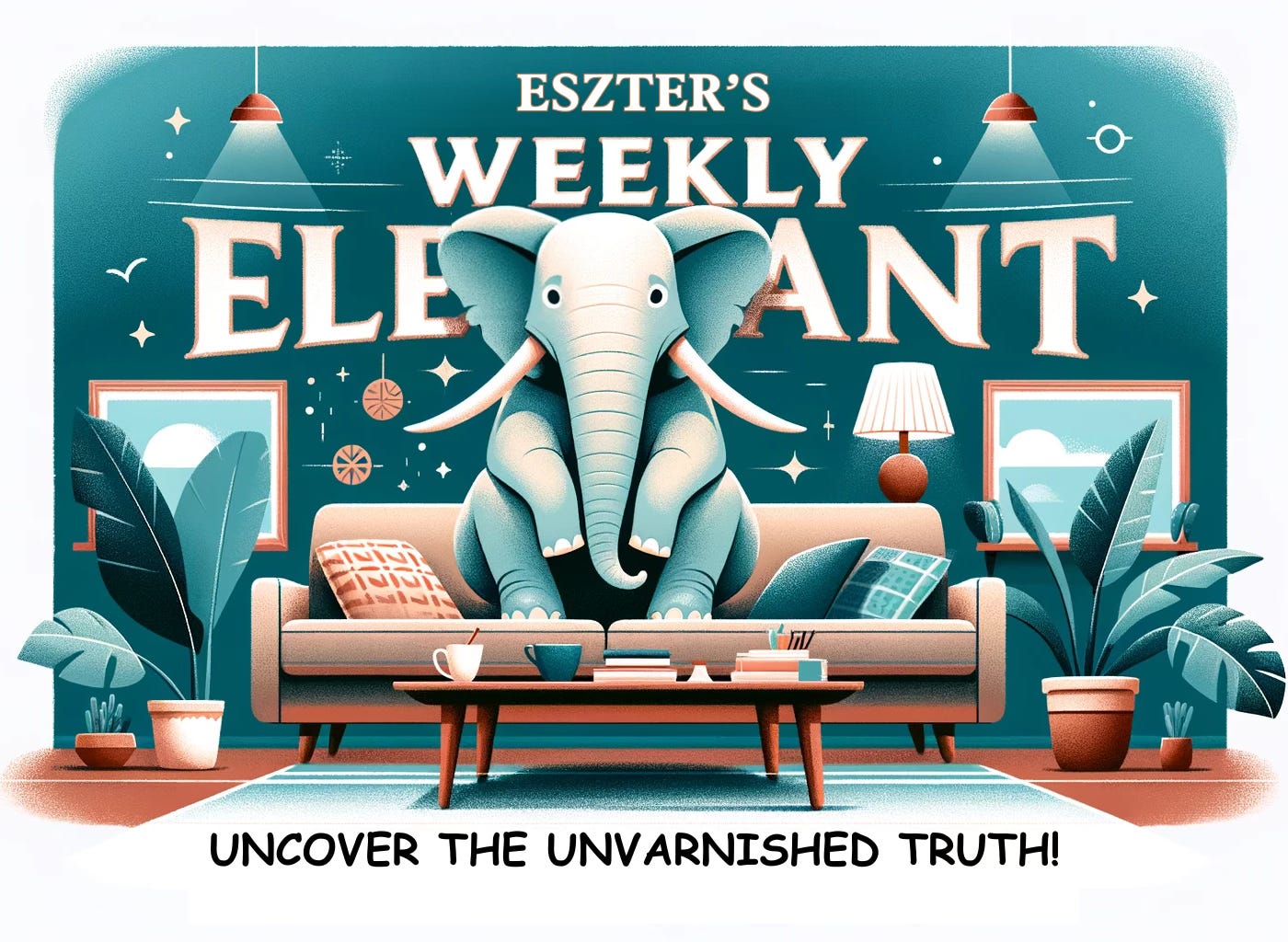
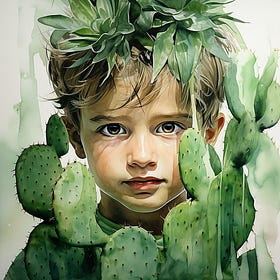
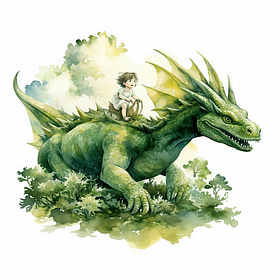
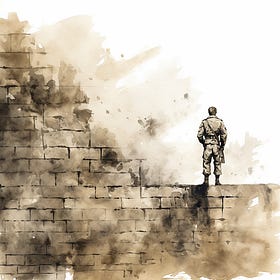




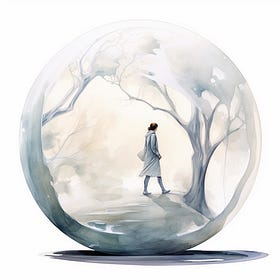


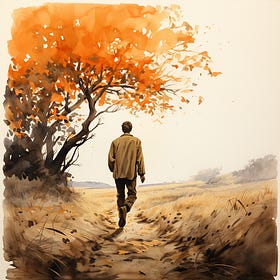
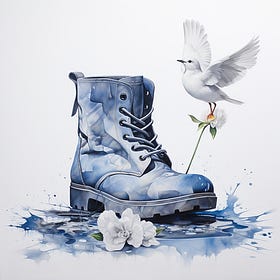

". the only viable path to happiness and peace is to uncover the unvarnished truth for ourselves" . How sure are you? How do you confirm it? Wat is the relationship between happiness and truth? Thanks for your work. I will digest your post to understand the elephant in me. FYI. I've been looking Sincere Souls for " Building Love among Religions for Engineering World's Peace". I need to find out that elephant of mine and the religious leaders. Hope you will consider working together.